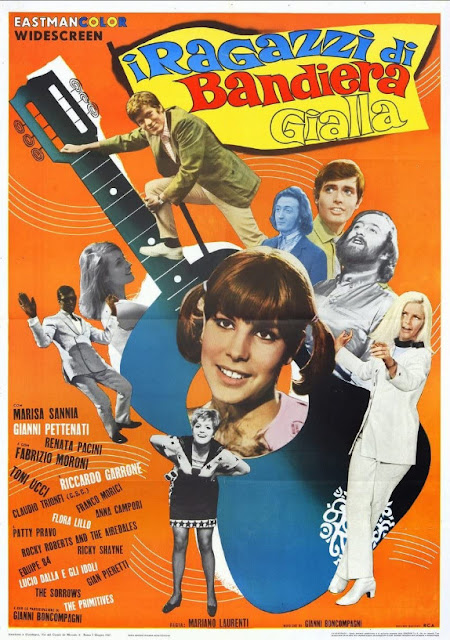The Sorrows Movie Period Italy 1967
It has been well documented how Coventry band, The Sorrows, spent time touring Italy during the 1960s. But while there, one of the unexpected spin off's, was when they rubbed shoulders with the Italian movie world.
And so it was, that during 1967, The Sorrows took part in the music for director Mariano Laurenti's film 'I Ragazzi di Bandiera Gialla'. In the movie the band appear towards the end of the movie where they perform the song 'Verde, Rosso, Giallo & Blu' (Green, Red, Yellow & Blue).
The line up of The Sorrows at that time was Pip Whitcher, Bruce Finley, Wez Price and Roger Lomas. And I asked Roger what he remembers of that time.
The answer was 'not much really'. The film set was where the old Spaghetti Westerns were recorded. So the band got to look around familiar cowboy film sets. They also visited locations for the epic Jason and the Argonauts. Particularly where Jason’s quest for the legendary Golden Fleece. Parts were filmed south of the Amalfi Coast.
Roger admitted that some of the other artists involved with the films score had a slicker image. The Sorrows, by their own insistence, wanted to keep there rock and roll image. That said, and for their song, the band were dressed in suits whose colours matched the song titled. Roger seemed to remember that he was in the yellow suit.
The storyline for 'I Ragazzi di Bandiera Gialla' (the lads of the Yellow Flag) is set in Rome. Carlo and Stefano compete for the love of Marisa, a student, basketball player and budding singer. Unknown to each other, the two teenagers rent two adjacent basements with the intention of turning them into "beat" dance clubs.
Meanwhile, Marisa manages to record her first album titled 'You will be proud of me'. This attracts the attention of a record producer. And it is not all in a professional manner.
It turns out that Marisa prefers Carlo over Stefano. And this becomes more and more evident after Carlo was forced into military service. There then follows a series of misunderstandings, that highlight the rivalry with Stefano.
The first album recordings of Marisa arrive in the hands of DJ Gianni Boncompagni, who decides to include them in his radio show.
Stefano manages to replace Marisa's record with his own and gets the desired feedback. Stefano can thus open his restaurant and club. But Carlo wants revenge and sabotages the opening. This results in Stefano and his friends resorting to a brawl.
It is Marisa who settles the dispute. She convinces the both Stefano and Carlo to join forces and to manage one single club. It opens with the name "Bandiera Gialla" – Yellow Flag. The club becomes a huge success.
The film stars: Gianni Pettenati as Stefano Quaranta, Marisa Sannia as Marisa Gelli, Fabrizio Moroni as Carlo Rossi and Renata Pacini as friend of Stefano
In addition to The Sorrows the films soundtrack includes music by Ricky Shayne, Lucio Dalla, Gian Pieretti, Claudio Trionfi, The Primitives, Gli Idoli, Renato Zero and Equipe 84.
And this, it turns out, wasn't the only time The Sorrows mixed it with the good and the great of the Italian movie industry.
%20Clip%20De%20Pel%C3%ADcula%20(1967).png)
%20Clip%20De%20Pel%C3%ADcula%20(1967).png)

.jpg)
.jpg)


